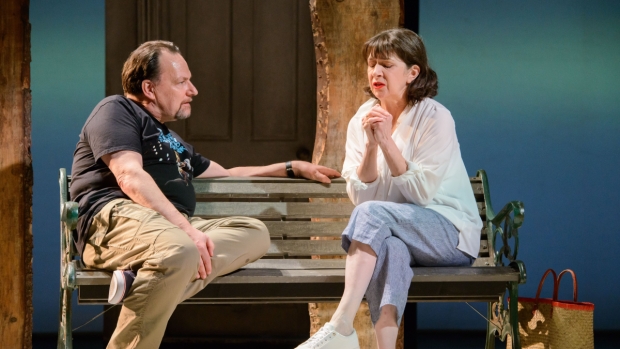The Scent of Roses at Royal Lyceum Theatre, Edinburgh – review

© Tim Morozzo
Zinnie Harris' new play opens amicably enough; tenderly, almost. A middle-aged married couple are in the midst of a discussion in their bedroom. They disagree, but they comfort one another, discuss dinner plans, and have apologetic sex. Their world seems pretty comfortable.
But then the play takes a screeching turn into a different story altogether. It turns out that Luci has locked Christopher in the bedroom so that they can "have a conversation", and clearly not about something he wants to discuss. Turns out it's about an incident in the past from which she thought they had moved on, and the play's first half hour becomes a series of short scenes designed to mirror the tension of the room and heighten a sense of curiosity about what's coming next.
However, that also encapsulates the play's biggest problem: a maddening inconsistency of tone. Affable Luci and Christopher have a turbulent past, but it's explored in a manner that heightens its absurdity rather than making them empathetic. It can't just be because I'm a man that I struggled to have sympathy for a wife who locks up her husband in order to talk to him.
It isn't helped that much of Harris' language feels clunky. There are tortuous – and ultimately directionless – arguments about the nature of sexual consent, and a bizarre dialogue about violent fantasies that seems to come from nowhere. When Christopher just so happens to find a letter about Luci's medical diagnosis, it feels like a tokenistic plot device.
If I didn't believe these characters then I struggled even more with the story of their daughter, Caitlin, and her relationship with Sally, her former teacher. This was another handbrake turn that felt like something from a histrionic teen drama, with too much angry shouting and firm-set grimacing. I warmed a little more to Helen, Sally's mother, but the first part of her scene sets her up as one kind of parent before changing its mind and reversing it clumsily in the second.
Harris, who directs her own play, gets good performances from her actors, aside from the monotone angst of Saskia Ashdown's Sally and Leah Byrne's Caitlin. As the central couple, Neve McIntosh and Peter Forbes manage to suggest that they might once have been happy (before she locked them in the bedroom, unsurprisingly) and Maureen Beattie makes Helen humane, despite the maternal U-turn she has to perform. Tom Piper's sets are very effective, too, the claustrophobic bedroom of the opening scene progressively breaking apart as the story develops, and suggesting a little bit of hope towards the end.
Ultimately, however, the characters' lack of credibility is on a par with the bluntness of the play's central theme. There's no love in these relationships, just manipulation, and none of the characters tell each other the truth until the final scene, when Luci and Christopher finally confess how they really feel about one another. By then, however, the play's emotional lurches and cumbersome language had made my patience run out, and the clunky visual symbolism of the final seconds only made me roll my eyes.










